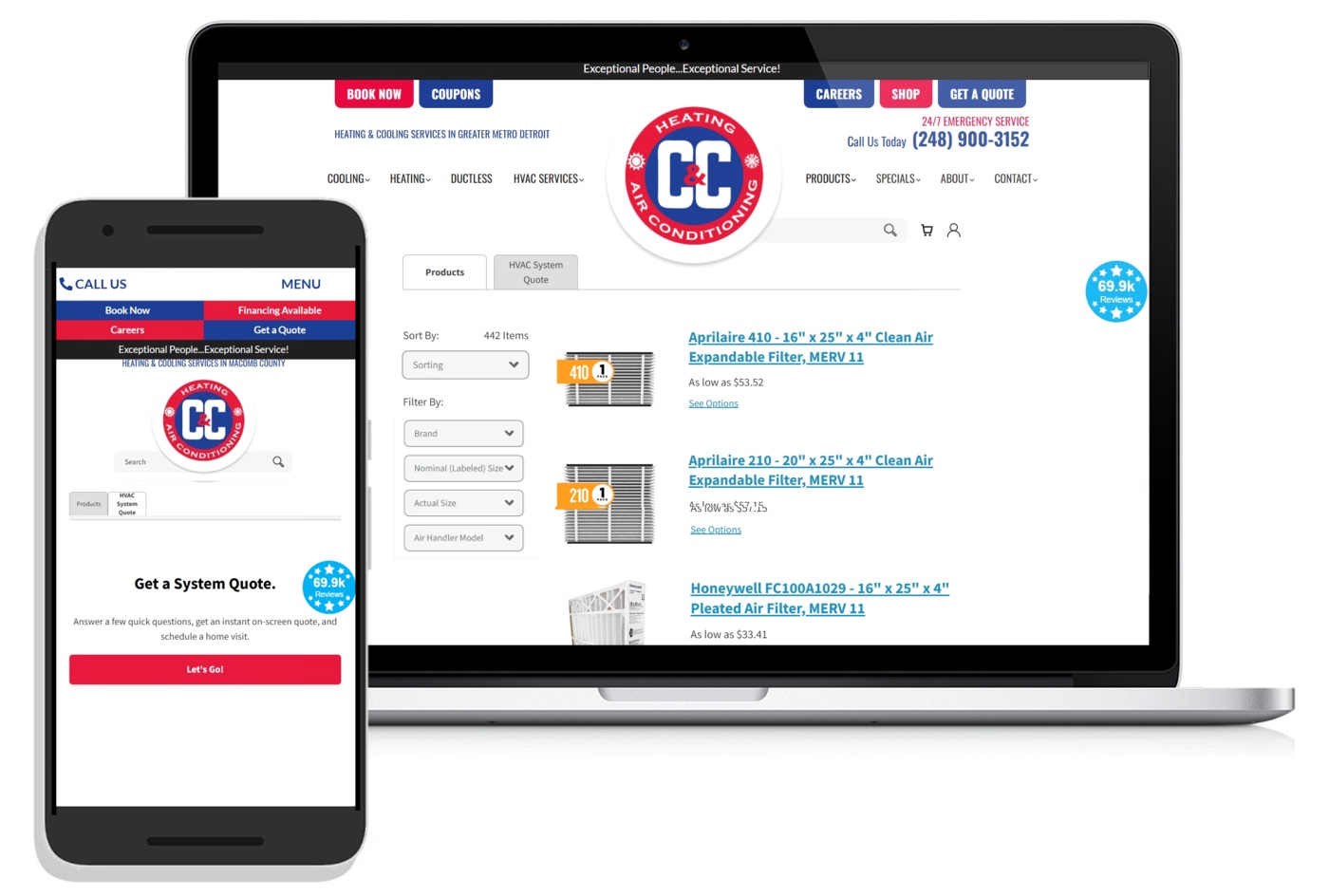✕
The average consumer can now purchase just about anything they like from the comfort of their own home. Online shopping has taken the world by storm, and it’s not slowing down anytime soon. Consumers have come to expect the convenience of shopping online across a variety of industries, and the HVACR industry is no exception.
Yet some HVAC contractors still haven’t caught on enough to offer their consumers a way to buy directly from them, on their website. Many remain hesitant to post products and prices and let the consumers take it from there — and rightfully so. After all, so much of the HVAC contractor’s job is to build and maintain relationships with their consumers.
But selling products online doesn’t have to be like that. It doesn’t have to be impersonal. In fact, an online store can not only bring in additional revenue, but also capture more traffic and build better relationships with consumers.
Selling products online, however, is a whole new ball game. HVAC contractors will want to learn about their consumers’ buying journeys, then thoughtfully consider how to launch the online store, what products to sell, and how to market it.
Benefits of Selling Online
To reap the benefits of selling products online, contractors have to first understand how their target consumer shops.
“Contractors have to realize that consumers are kind of in control of their own buying journey,” said Paul Redman, vice president of sales and success at Contractor Commerce.
And Redman uses the “buying journey” in a very specific way. Because what Contractor Commerce encourages contractors to do is not simply list products on their website with a price tag, but instead think about the buying process their ideal consumer goes through when they need to make a major purchase like an HVAC system.
“That buying process usually starts with gathering information online,” Redman said. “And what contractors are doing now is being that resource and letting the homeowner go through the buying journey on their existing company website, rather than going through a buying journey on a home advisor or a Lowe’s or an Angie’s List, because [contractors] want to control their customer journey and then connect with that customer, build the brand, and ultimately sell something in the home.”
Nowadays, most consumers already prefer the convenience of online shopping — especially the younger ones.
“As a millennial, the majority of my shopping is done online,” said Dayna Hottle, general manager at C&C Heating and Air Conditioning in Roseville, Michigan. “From clothing to groceries, nearly all my purchases are made through digital platforms, with deliveries arriving at my doorstep regularly, often from Amazon. To succeed in today’s market, businesses must meet consumers where they are — offering both convenience and accessibility.”

THE MODERN AGE: Most of the world does majority of their shopping online. So for contractors to succeed in today’s market, businesses must meet consumers where they are—offering both convenience and accessibility. (Courtesy of C&C Heating and Air Conditioning)
By selling products online, contractors can offer consumers that ease and convenience. As a result, they also broaden their customer base potential, according to Tim O’Brien, general manager at CM Heating, Cooling, Plumbing, & Electrical in Everett, Washington.
“There’s also a reduction in resources and cost — no driving to see customers across a wide geographic area,” O’Brien said. “By selling products online, there will be more calls or bids per sales rep per day compared to driving to homes.”
Challenges
Of course, contractors will run into a few challenges along the way. For some of them, the biggest challenge they’ll face is the hesitation they feel to sell products online in the first place.
“The concept of selling online feels really, really, threatening to contractors, and it should be, because the assumption/feeling is, ‘We’re going to be just transacting with our customers blindly over the internet, versus meeting with our customers, building a relationship, and transacting in the home,’” Redman said.
But what’s important for contractors to realize is that it’s an “and” situation, not an “or” situation. When contractors start selling on their website, what they are doing is letting more customers go through the buying journey, and it allows them to go as far as they want.
“It might be getting a price. … It might be buying a membership, a tune-up, a duct cleaning, or seeing how much it costs to get their dryer vent cleaned, ‘and’ then engaging with the customer in a human-to-human way, like sending a quick text message, making a quick phone call, booking an expert to go out to the house to measure their system, see what kind of generator they would need. That’s where the ‘and’ comes in,” Redman said.
Another challenge when selling products online is the overwhelming, complex number of options consumers might be faced with, as well as the potential for price shock, since the contractor won’t have the opportunity to educate, O’Brien said.
Additionally, since homeowners are rarely experts on HVAC equipment and systems, there is more room for error when they are the ones ordering products.
“One of the most common issues is customers selecting the wrong filter or size for their home,” Hottle said. “However, as we focus on educating homeowners, these hiccups are becoming less frequent. Providing customers with the knowledge they need ensures a smoother experience and helps them make more informed decisions for their homes.”
Deciding to Sell Online
It seems likely that one day, all HVAC contractors will have some sort of online shopping experience for their consumers.
At least, Redman thinks so. Whether or not now is the right time for an HVAC contractor to start selling products online comes down to their views about the future and about the customer, he said.
“And they need to ask themselves: Are consumers shopping online more or less? Will that slow down? Will it grow?” Redman said. “I think the answer is pretty obvious. It will grow.”
Some contractors might want to go right to the source to see if selling products online is the right call for their business — meaning, asking their current customers if they see a value in them offering an online store.
O’Brien said a contractor can decide if selling products is the right call for their business if it fits their current brand and local image.
“Also, can they dedicate the needed resources to answering questions and following up in a timely manner?” O’Brien queried. “If no, then it’s not worth it.”
For those contractors who spend money on bringing traffic to their website, Redman said they need to think hard about how much they are spending, how much traffic they are getting, how much of that traffic leaves their website without taking action, and if they can capture more of that traffic with an online store.
Where to Start
For contractors who decide that selling products online makes sense for their company, the next question is where to start.
Contractors can decide to handle selling online internally, or collaborate with a strategic partner of sorts.
“We’ve chosen to partner with Contractor Commerce, which allows us to streamline operations,” Hottle said. “This partnership eliminates the need for us to stock filters, as they ship directly to the end consumer, ensuring delivery within just a few days. Their platform made it incredibly efficient for us to launch our online store, requiring only a few hours of our time to set everything up.”
For selling products online to be successful, every contractor who offers it has to ensure that their website is up to date, and that they have qualified people in place to reply to the online store inquires, O’Brien said.
Contractors then have to decide what products to sell online. It’s really a case-by-case basis, based on what makes the most sense for their own specific business.
Redman divides the type of products contractors can sell online into three categories: products a third-party professional company like Contractor Commerce would fulfill for a contractor, products that can be shipped to a customer’s home potentially as an installed service, and then recurring revenue services like memberships or subscriptions.
“We don’t recommend just putting all your products online and letting people check out,” Redman said. “Instead, a tailored approach of like, ‘What are the products that someone could fulfill for us and create a great experience for our homeowner?’ ‘What are the products that we could fulfill locally?’ ‘What are the services that make sense?’ And then, ‘How far do we want to let a homeowner go on the major items that drive revenue for our business?’”
O’Brien said the products contractors should sell online are the ones they can easily service and the ones that are easy to purchase/commonly sold.
“Not the one-off items,” O’Brien said.
Contractors have to also market their online stores. Consumers can’t shop at a contractor’s online store if they don’t even know about it.
“As with any product or service, simply making customers aware of its availability is essential,” Hottle said. “Effective communication channels like email, stickers, word of mouth, social media, and your website are all excellent ways to spread the word and engage your audience.”
Whether you require installation, repair, or maintenance, our technicians will assist you with top-quality service at any time of the day or night. Take comfort in knowing your indoor air quality is the best it can be with MOE heating & cooling services Ontario's solution for heating, air conditioning, and ventilation that’s cooler than the rest.
Contact us to schedule a visit. Our qualified team of technicians, are always ready to help you and guide you for heating and cooling issues. Weather you want to replace an old furnace or install a brand new air conditioner, we are here to help you. Our main office is at Kitchener but we can service most of Ontario's cities
Source link


